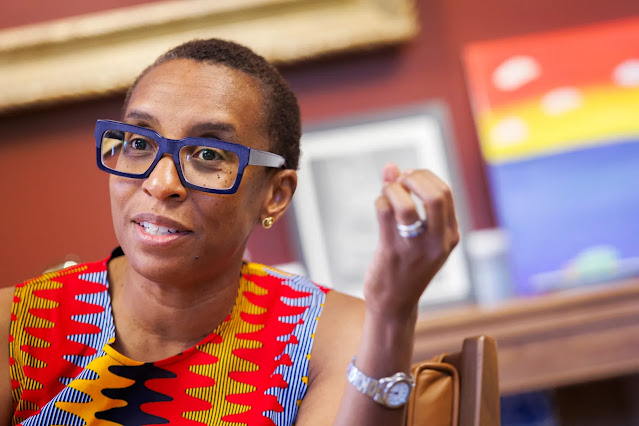 Image Credit: Harvard Gazette
Image Credit: Harvard Gazette
By Adetayo Adetokun
In academia, few stories captivate the imagination quite like that of Claudine Gay’s ascension to the presidency of Harvard University. A distinguished scholar, and a trailblazer for diversity and inclusion, her journey to the helm of one of the world’s most prestigious institutions is as remarkable as it is inspiring.
Claudine Gay’s trajectory to Harvard’s presidency was marked by a series of groundbreaking achievements and a steadfast commitment to excellence. With a Ph.D. from Harvard and a stellar career as a government professor, she first graced the university’s halls in 2006. Known for her keen insights into political behavior and her nuanced examination of race and politics in America, Gay quickly established herself as a leading scholar in her field.
But it was not just her academic prowess that caught the attention of Harvard’s leadership. It was her unwavering dedication to fostering diversity, equity, and inclusion within the university community that set her apart. As a dean for Harvard’s Faculty of Arts and Sciences, Gay spearheaded initiatives to create a more inclusive campus environment, championing the voices of underrepresented minorities, and advocating for meaningful change.
In July 2023, amid much fanfare and anticipation, Claudine Gay made history as she assumed the role of Harvard’s 30th president. Her appointment was not just a personal triumph but a testament to the university’s commitment to embracing diversity and embracing the leadership of individuals from diverse backgrounds.
Across the world from Massachusetts where Harvard is located, the Israel-Palestine conflict, with its deep-seated historical and geopolitical complexities, has long been a flashpoint for controversy and debate. As the conflict flared anew, with violence erupting in the Gaza Strip and the West Bank, campuses across the United States became arenas for impassioned discourse and protests. Harvard was no exception.
Against these hostile developments, reports of antisemitism and Islamophobia on college campuses nationwide surged, prompting heightened scrutiny of university leaders’ responses. Claudine Gay, along with other university presidents, faced mounting pressure to address concerns about Jewish students’ safety and confront instances of hate speech and discrimination on campus.
In December, Gay found herself thrust into the spotlight as she testified before a House Committee on Education and the Workforce on antisemitism on college campuses. Her responses to probing questions, particularly regarding Harvard’s policies on hate speech and bullying, ignited a firestorm of controversy.
Critics seized upon Gay’s remarks, accusing her of failing to provide unequivocal condemnation of antisemitism and questioning her commitment to addressing the safety and well-being of Jewish students. Amidst the uproar, protests erupted on campus, with students demanding greater accountability from university leadership and swift action to combat hate speech and discrimination.
As tensions continued to simmer and accusations swirled, Claudine Gay’s leadership came under unprecedented scrutiny. Allegations of mishandling antisemitism and failing to address concerns about Jewish students’ safety adequately cast a shadow over her presidency, raising questions about her ability to navigate the complex and volatile landscape of campus politics.
Accusations of plagiarism also emerged as a significant aspect of the controversy surrounding Claudine Gay’s tenure as Harvard’s first Black president. These allegations added another layer of complexity to an already challenging situation, prompting scrutiny of both Gay’s academic work and her leadership.
The accusations focused on similarities between portions of Gay’s academic writing and other sources, raising questions about the originality of her work. Despite initial investigations by Harvard finding no evidence of misconduct, the allegations persisted, casting doubt on Gay’s scholarship and character.
For Gay, who had established herself as a respected scholar and academic leader, the accusations were deeply troubling. They called into question not only her professional reputation but also her personal integrity and dedication to scholarly ethics.
The controversy surrounding the plagiarism allegations prompted broader discussions about the expectations placed on leaders, particularly those from underrepresented backgrounds. It underscored the challenges of navigating institutional dynamics while upholding principles of academic integrity.
As the controversy unfolded, Gay faced difficult decisions about how to respond and how to address the allegations. She found herself navigating a complex landscape of public scrutiny and institutional pressure, all while striving to maintain her credibility and leadership.
She was forced to resign.
The controversy surrounding Claudine Gay’s tenure as Harvard’s first Black president brought to light broader issues of systemic bias and discrimination in academia, particularly towards women of color. As Gay found herself under intense scrutiny, the intersection of race and gender magnified the challenges she faced, exposing the pervasive misogyny and racism that persist in academic institutions.
Women of color in positions of leadership are often subjected to heightened scrutiny and criticism, facing unfair expectations and double standards compared to their white male counterparts. The barriers to advancement for women of color in academia are numerous and multifaceted, reflecting deeply ingrained biases and structural inequalities.
Misogyny in academia compounds the challenges faced by women leaders, perpetuating stereotypes and undermining their authority and credibility. Women leaders are often subjected to sexist stereotypes and microaggressions, which can erode their confidence and undermine their ability to lead effectively.
In the case of Claudine Gay, the majority of her accusers were white and male, highlighting the intersecting dynamics of race and gender in the criticism she faced. The imbalance in power and privilege between Gay and her accusers underscored the systemic inequalities that women of color confront in predominantly white and male-dominated spaces.
The impact of public criticism on women leaders, particularly women of color, can be devastating, with far-reaching consequences for their careers and professional trajectories. The scrutiny and backlash faced by Gay not only undermined her authority and credibility but also reinforced harmful stereotypes about women of color in positions of power.
As we reflect on the challenges faced by Claudine Gay and other women leaders in academia, it is imperative to recognize the systemic biases and structural inequalities that perpetuate gender and racial disparities. By acknowledging and addressing these issues, we can work towards creating a more inclusive and equitable academic environment where all individuals, regardless of gender or race, can thrive and succeed.
Claudine Gay’s historic tenure as Harvard’s first Black president has reverberated far beyond the walls of academia, leaving an indelible mark on the landscape of higher education and inspiring generations of black women and young girls to dream big and break barriers.
As a trailblazer in her field, Gay’s achievements have transcended mere symbolism, fundamentally altering perceptions of what is possible for black women in academia. Her ascent to the presidency of one of the world’s most prestigious institutions has shattered glass ceilings and set a powerful example of resilience, determination, and excellence.
For black women and young girls everywhere, Gay’s feat serves as a beacon of hope and inspiration, affirming their worth and potential in a world that too often seeks to diminish and marginalize them. Her leadership has opened doors and created opportunities for future generations to pursue their dreams with confidence and conviction.
In academia, Gay’s presidency has sparked conversations about diversity, representation, and inclusion, prompting institutions to confront the systemic barriers that have long hindered the advancement of women of color. Her leadership has set a new standard for excellence and integrity, challenging the status quo and paving the way for a more equitable and inclusive academic environment.
At Shades of Us, we are deeply impressed by Claudine Gay’s achievements and the impact of her presidency on black women, young girls, and academia as a whole. We commend her for her trailblazing leadership and unwavering commitment to excellence, and we stand in solidarity with her in the ongoing fight for gender and racial equality.
As we celebrate Claudine Gay’s legacy, we are reminded of the importance of creating spaces where women, especially women of color, are allowed to thrive without fear of scrutiny or discrimination. We hope that her example will inspire future generations to challenge stereotypes, defy expectations, and pursue their passions with courage and conviction.





